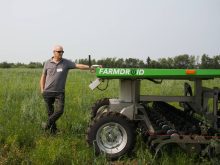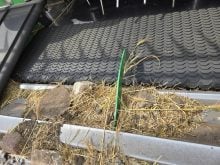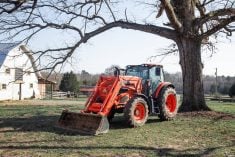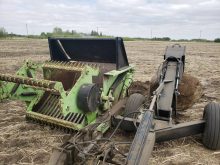Cam Goff might want to get a lawyer.
The farmer from Hanley, Sask., is pursuing a service complaint against Canadian National Railway over its plan to delist 53 producer car loading sites on the Prairies.
In its formal response to Goff’s complaint, CN submitted a nine-page document to the Canadian Transportation Agency consisting of legal arguments, quoting legislation and regulations and citing previous rulings by various courts and the agency.
Faced with the legalese, Goff acknowledged he might need to fight fire with fire.
Read Also

Nature Conservancy of Canada buys more property in southwestern Saskatchewan
Nature Conservancy of Canada has added to its Saskatchewan holdings with the purchase of slightly less than 1,600 acres in the eastern Cypress Hills area.
“I certainly realize there may be a time in this process where I will need a lawyer,” he said.
In its Jan. 18 submission to the CTA, CN said it has followed all the rules and the CTA has no authority to interfere with its plans to shut down producer car loading sites.
“In the absence of clear language, the agency cannot issue an order preventing CN from proceeding in accordance with the process set out in that section,” it said.
All the railway is required to do under section 151.1 of the Canada Transportation Act is publish in local newspapers notice of its intention to delist sidings, which it did in June 2009.
CN also argued that the Canada Grain Act may guarantee farmers the right to ship producer cars, but it doesn’t create an entitlement to use specific loading sites.
As well, it said Goff failed to meet the conditions required under the CTA to receive an interim injunction preventing the railway from going ahead with its plan, which means his request for a moratorium should be dismissed.
Goff said he has never suggested the railway didn’t follow all the rules.
Rather, he is arguing that the entire process is flawed and unfair to producers and should be halted.
“I believe the CTA does have the power to tell CN they can’t pull these sites,” he said.
“I believe it is in their mandate, but they choose not to do so.”
However, he said the primary responsibility to deal with this issue lies with the federal government, which clearly has the ability to change the rules to preserve the loading sites.
“I don’t think the feds want to do anything, and they’re keeping their heads down and hoping this will blow over,” he said.
Agriculture Producers Association of Saskatchewan president Greg Marshall agreed, saying he was disappointed by the federal government’s apparent lack of interest in the loading sites issue.
“It’s disappointing to see that they aren’t being active, and they’re letting this slide,” he said. “Time goes by and pretty soon it’s spring and those sidings will be torn up.”
APAS had tried to file its own service complaint against CN, but the CTA rejected the application after the farm group failed to provide detailed information on the use of specific loading sites.
“That’s impossible for us to do,” said Marshall, adding the APAS request was for a broader review of CN’s loading site policy.














